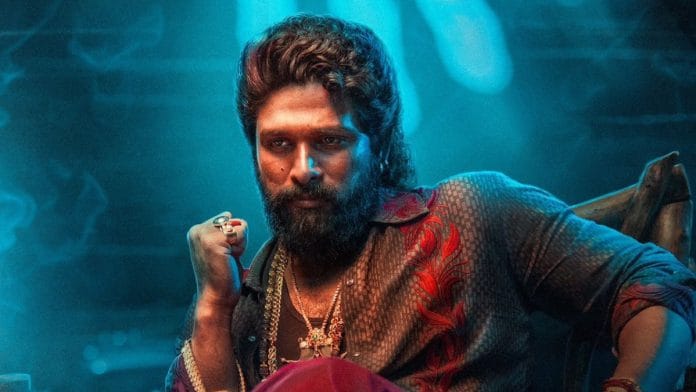Pushpa might tell the villains ‘main flower nahin, fire hai’—I am fire, not flower—but not before his wife Srivalli, Rashmika Mandanna. In the world of Pushpa, it is the men with education, privilege, and power, who are more misogynistic. Both installments of the Pushpa series ooze with hypermasculinity. Even the songs, ‘Oo Antava’ and ‘Kissik’, pander to the male gaze. But parallel to this macho world where Pushpa operates—crushing bad men and killing them with fire—lies a pookie husband, with golden retriever energy. And Srivalli is the black cat in this equation. For those unversed, this is quintessentially Gen Z social media lingo to indicate men with healthy behaviour toward their romantic partner.
Black cat energy refers to a more fiery partner, especially women, who would be more protective of their ‘softer’ men.
Pushpa, played by Allu Arjun, will absolutely do anything for Srivalli. When the chief minister of the state tells Pushpa to not take his wife very seriously, it irks him. He would leave an important meeting to get an upset Srivalli smile again. When she stubs her toe, he holds it, saying, “I am not ashamed of the fact that I bow before you. In fact, it is a privilege”.
Also read: Pushpa 2 fever grips Telugu & Tamil film industries—Atlee, Rana Daggubati are raving about it
Being vulnerable
Most hypermasculine movies show the lead with a saviour complex, and valourise the protector figure. Pushpa 2 manages to move beyond that straitjacket narrative. Pushpa has limited options and exposure to healthy male behaviour. He is taught that class and caste can only be superseded by wealth and power. So he does whatever he can to acquire both. But it is not in contrast with respect for women.
Pushpa shows that ‘fire or wildfire’ he may be for his haters, but vulnerability is also equally important. In the world of ghosting, lovebombing, and macho, Pushpa tries to be vulnerable, even if everything else might be a tad too fancy for him to know. While most of his tough exterior is reserved for the men who are constantly demeaning him for his origins of being a labour, or are envious of his meteoric rise, he is a big softie for other labourers. These are his brethren.
The other common denominator in hypermasculine films is the ‘maa’ factor, where the hero’s world is his mother. Pushpa, too, loves his mother, but there are no chest-thumping gestures. His love is subtle, and he means to show it by being there for her.
When his brother finally acknowledges his existence, instead of sneering at his ‘illegitimate’ status, Pushpa breaks down. And he cries, openly, loudly, not drenched in rain and solitarily like most ‘macho’ heroes do, but surrounded by the women of the household. And in that, he probably tells all the men hooting in theatres: it is okay to cry, and be vulnerable. That does not make a guy any less of a ‘wildflower’. After all, Pushpa still holds his raj or empire till the very end, while being emotionally available to Srivalli. It is not that hard. One might have to topple a government, but if it makes her happy, and also teaches someone else a lesson to not crack typical wife jokes, why not?
Views are personal.
(Edited by Aamaan Alam Khan)






